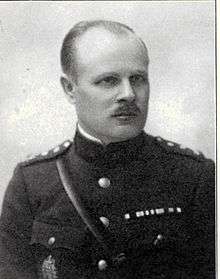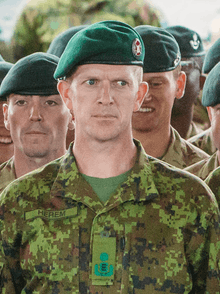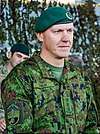Headquarters of the Estonian Defence Forces
The Headquarters of the Estonian Defence Forces is the working body of the Commander of the Estonian Defence Forces and joint staff of the Estonian Defence Forces.[2] Its main tasks include supporting the activities of the Commander and Deputy Commander of the Defence Forces; planning the activities of the Defence Forces; advising, supervising, coordinating and controlling the activities of the Defence Forces units.[3]
| Headquarters of the Estonian Defence Forces | |
|---|---|
| Eesti Kaitseväe peastaap | |
 Insignia of the Headquarters of the Estonian Defence Forces | |
| Active | 1918–1940 1991–present |
| Country | |
| Part of | Estonian Defence Forces |
| Garrison/HQ | Juhkentali 58, 15007, Tallinn, Estonia |
| Motto(s) | Viribus unitis (With united forces) |
| Anniversaries | 26 November (formed) 31 October (restored)[1] |
| Engagements | Estonian War of Independence |
History
The first headquarters of the Estonian military was initially formed on December 6, 1917, as the Staff of the Estonian Division. The formation of the headquarters was conducted by Andres Larka and Jaan Soots. The Staff of the Estonian Armies was officially established on 26 November 1918, with Andres Larka becoming the Chief of Staff. In 1926, the Staff of the Estonian Armies was abolished and its functions were transferred to the General Staff, which was subordinate to the Minister of War. In 1929, the General Staff and the Administrative Agency were joined into the Staff of the Defence Forces. On April 1, 1937, it was renamed the Staff of the Armies. The headquarters was abolished in 1940, after the Soviets occupied Estonia.[4]
The headquarters was re-established on 31 October 1991, as the General Staff of the Defence Forces, with Ants Laaneots becoming the Chief of Staff. In 1995, based on the Navy and Air Force Departments of the General Staff, the Navy Staff and the Air Force Staff became independent units. In 2001, the Army Staff also became independent. In 2009, the General Staff was renamed the Headquarters of the Estonian Defence Forces.[5]
Structure
The Headquarters of the Estonian Defence Forces is mainly tasked with counseling and supporting the activities of the Commander of the Estonian Defence Forces, planning the activities of the Defence Forces, organizing the training of the Defence Forces, planning and coordinating military operations, and preparing and organizing mobilization. It is headed by the Chief of Staff of the Headquarters, who commands the staff and corresponding subordinate units.[6] The headquarters consists of various departments: the General Department, Strategic Communication Department, Personnel Department (J1), Operations Department (J3), Logistics Department (J4), Analysis and Planning Department (J5), Signals Department (J6), Training Department (J7), and Budget and Finance Department (J8).[5]
Chief of Staff
The Chief of Staff is responsible for providing information and analysis to the Commander of the Defence Forces, preparing and executing national defence, developing and managing command structures, administrating the Headquarters of the Defence Forces, managing of the Defence Forces resources and investments, planning military operations, organizing international cooperation and mobilization. The Chief of Staff is supported in his/her activities by the Deputy Chief of Staff, who can also stand in for the Chief of Staff in his/her absence.[6]
List of Chiefs of Staff[5]:
| No. | Chief of Staff | Took office | Left office | Time in office | |
|---|---|---|---|---|---|
| 1 | Major General Jaan Soots (1880–1942) | 1917 | 1920 | 2–3 years | |
| 2 | Colonel Jaan Rink (1886–1927) | 28 March 1920 | October 1920 | 0 years | |
| 3 | Major General Paul-Adolf Lill (1882–1942) | 1920 | 1925 | 4–5 years | |
| 4 | Major General Juhan Tõrvand (1883–1942) | 1925 | 1934 | 8–9 years | |
| 5 | Major General Nikolai Reek (1890–1942) | 1937 | 1939 | 1–2 years | |
| 6 | Major General Aleksander Jaakson (1892–1942) | 1939 | 1940 | 0–1 years | |
| Vacant Soviet rule | |||||
| 7 | Major General Ants Laaneots (born 1948) | 1991 | 1999 | 7–8 years | |
| 8 | Lieutenant Colonel Aarne Ermus (born 1966) | 1999 | 2002 | 2–3 years | |
| 9 | Brigadier General Alar Laneman (born 1962) | 2002 | 2006 | 3–4 years | |
| 10 | Brigadier General Neeme Väli (born 1965) | 2007 | 2011 | 3–4 years | |
| 11 | Brigadier General Riho Terras (born 1967) | March 2011 | 5 December 2011 | 0 years | |
| 12 | Brigadier General Peeter Hoppe (born 1960) | 15 December 2011 | 8 July 2013 | 1 years | |
| 13 | Commodore Igor Schvede (born 1970) | 2013 | 2016 | 2–3 years | |
| 14 | Major General Martin Herem (born 1973) | 15 July 2016 | 4 December 2018 | 2 years | |
| 15 | Brigadier General Veiko-Vello Palm (born 1971) | 5 December 2018 | Incumbent | 1 years | |
Departments
The General Department of the headquarters deals with administrative tasks. The Strategic Communication Department organizes public affairs, civil-military cooperation and information operations. The Personnel Department (J1) organizes human resources. The Operations Department (J3) is tasked with planning national defence, military operations, mobilization and readiness. The Logistics Department (J4) manages the economic activity of the Defence Forces. The Analysis and Planning Department (J5) deals with long-term planning and development of defence capabilities. The Signals Department (J6) is responsible for communication and information systems of the Defence Forces. The Training Department (J7) organizes training and exercises of the Defence Forces. The Budget and Finance Department (J8) is tasked with accounting and preparing the budget of the Defence Forces.[5]
Symbols and flags
The Headquarters of the Estonian Defence Forces received its flag on 29 October 2010. The flags blue field contains the emblem of the headquarters, with "KAITSEVÄE PEASTAAP" written in silver at the top, and two silver datums at the bottom - one marking the formation date and the other marking the restoration date of the headquarters. There is a small coat of arms of Estonia in the centre, which is supported by a crossed sword and staff in silver. The coat of arms is surrounded by a golden North Star, a wreath made of oak leaves, and a ribbon with the motto "VIRIBUS UNITIS". The crossed sword and staff symbolize the higher command level, the coat of arms and North Star symbolize the national level and international cooperation. The motto 'With United Forces' refers to the unity of the forces. The flag was designed by Margus Haavamägi.[7]
Building of the Headquarters
The house was built in 1925 for a military hospital. The architect was Aleksander Vladovski. As many other Vladovski's buildings, the house at 58 Juhkentali Street is designed as Neo-Classicist, with some elements of late Jugend style. The planning solution involves three wings. In the Soviet time the building also housed a military hospital. In the 1990s the plot was transferred to the Defence Forces.
References
- Kaitseminister andis Kaitseväe Peastaabile lipu üle
- "Kaitsevägi - Juhtimine". www.mil.ee (in Estonian). Retrieved 16 July 2018.
- "Kaitseväe põhimäärus". www.riigiteataja.ee (in Estonian). Retrieved 16 July 2018.
- Nõmm, Aart (2011). Noorits, Tõnu (ed.). "Teenistusest Kaitsevägede Staabis aastatel 1926-1934". Kaitseväe aastaraamat 2010 (in Estonian). Headquarters of the Estonian Defence Forces: 110–115. Retrieved 23 March 2018.
- "Headquarters of the Estonian Defence Forces". mil.ee. Retrieved 22 March 2018.
- "Kaitseväe põhimäärus". www.riigiteataja.ee (in Estonian). Retrieved 22 March 2018.
- "Kaitseminister andis kaitseväe peastaabile lipu". www.postimees.ee (in Estonian). 29 October 2010. Retrieved 16 July 2018.
External links
- Kaitseväe Peastaabi põhimäärus (in Estonian)





.jpg)


